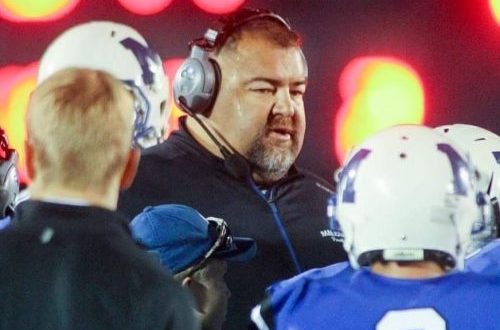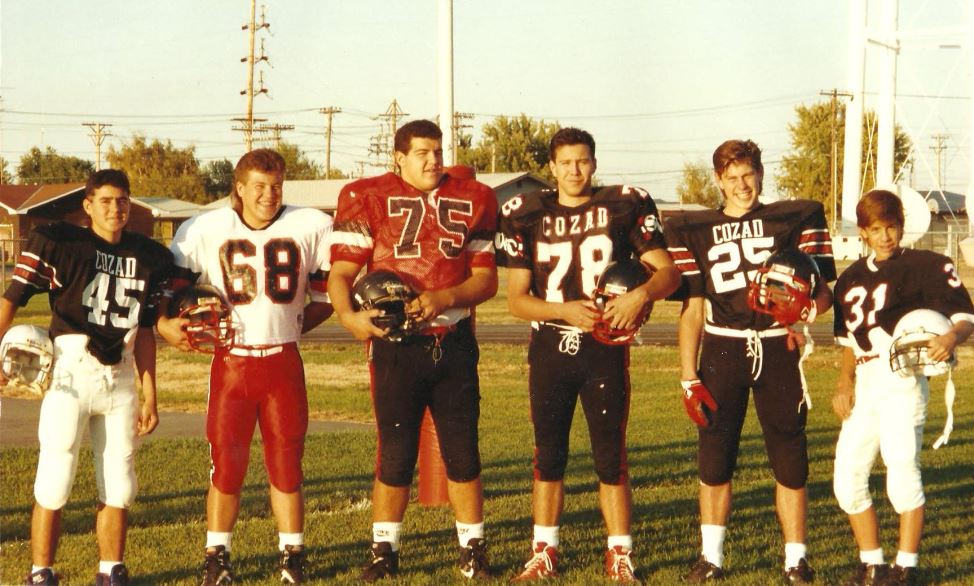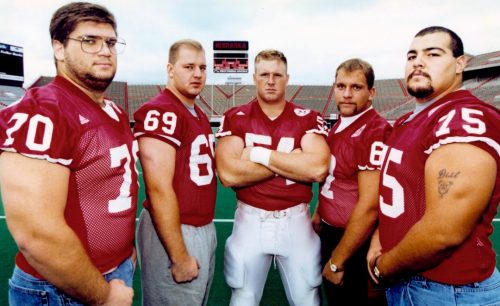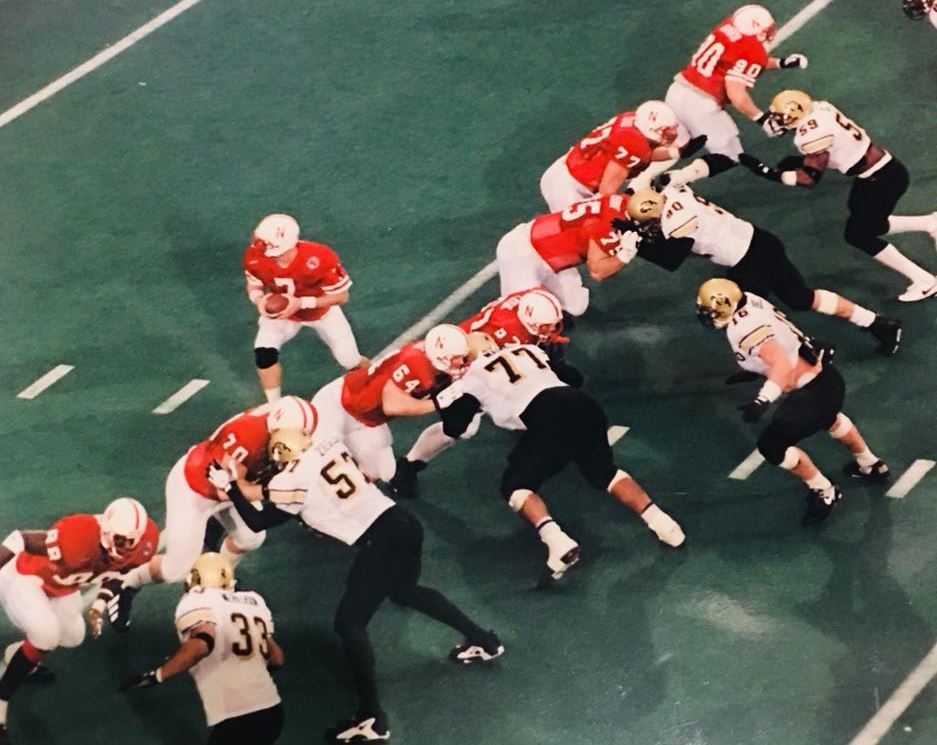Anatomy of an Era: Chris Dishman, Part 3

Excerpted from Chapter 53, No Place Like Nebraska: Anatomy of an Era, Vol. 1 by Paul Koch
Anatomy of an Era: Chris Dishman, Part 3
Q: Any memorable practice stories?
CD: I remember (laughs) the most memorable was late in the season and I think Aaron Graham made All-American. And Christian (Peter) was just getting in his grill about it, talking, “You ain’t All-American. You suck!” Just going on and on. And we get in a short-yardage situation and it was one-on-ones, and Christian just ran over Aaron Graham and was talking smack the whole time. And Aaron Graham comes back to the huddle just screaming, “Let’s kill ’em!” I remember that instant we were full go.
And we end up having about two more plays and it was getting really physical, and that was one time where Coach Osborne actually cut us off. He was afraid somebody was going to get hurt. We were going for blood and they were going for blood. No longer was it Nebraska against Nebraska, it was Nebraska against the enemy. (laughs) It was good against evil. I just remember Coach Osborne calling that up and then basically just shutting down practice. At the very end it was like, “That’s enough. We’re done.”
It was late in the season, so it had to be against Colorado or Kansas or one of those late games in the season. I can’t remember who we were getting ready for. It was under the lights, so it must have been Colorado and we were practicing late at night for some reason. I just remember it was a foggy day and you could see your breath, and I just remember Christian talking smack and Aaron coming back to the huddle all pissed off and just spitting out of his facemask, “Let’s kill ’em!” He was so worked up you could hardly understand a damn thing he said, which almost made you want to laugh. (laughs)

Q: What are you the most proud of?
CD: Most proud of? You know, being part of that ’95 team, I guess. I think just being able to say that you were on probably the greatest team ever to play the game. Looking back now? If you look at the stats and everything, we were pretty salty. You didn’t look at it that way when you played, but I think the closest game we played was like 14 points. … They got their points and it really wasn’t a game, but that was considered the closest game that year. I don’t know, I just think being a part of that was probably my greatest accomplishment there at Nebraska.
Also, being named a team captain for the ’96 team, that was an honor. Just knowing that tradition of the captains who came before you, who they were; being voted by your peers to be captain was a great honor.
Q: Were you one of those guys who got the flu the week before that inaugural Big 12 Championship/Texas game?
CD: No, I didn’t get the flu, but like 13 of them did. I remember the ’95 year against Kansas -which was back-to-back night games- because during the Colorado week I came down with walking pneumonia. I had a week and a half to prepare for that Thanksgiving game. And I remember I lost 25 pounds and had to go the hospital and get put on a respirator thing, and got to come in and play against Colorado that week. So I didn’t get the flu like everybody got after that game, I already had pneumonia for the previous game. (laughs)
It was walking pneumonia or something like that. I went in for treatment every day. I went in to see Dr. Albers and those guys and said, ‘Man, I feel great! I just jumped in a cold shower and broke the fever. I feel great!’ And they were like, “You just broke one and you feel great?” And they took my temperature and it was 104, still. (laughs) And the whole time I was, ‘Now I feel great!’ (laughs)
Q: It beat the heck out of 106 degrees, right?
CD: Yeah, I felt like a million bucks because I just ‘broke it.’ I felt awesome. (laughs)
Q: Maybe you guys on the O-line had more pain tolerance than most folks?
CD: I don’t know, but anytime you’ve got fevers, they suck. I just remember being so miserable I couldn’t even get out of bed.

Q: Any thoughts on the backs you guys were blocking for?
CD: Tommie was all business in the huddle. He wanted to score on every play. He was very, very serious. His demeanor was his demeanor, that was Tommie. Some people might call it a negative knock on him because he was that way, and he didn’t really build the great friendships off the field because of the way he was on the field. He made it clear he was there to play football and not befriend, but that’s just the way Tommie was. But I never wanted a different quarterback in the huddle, because Tommie wanted to score on every play. He let it be known that if you missed a block, he’d tell you. If he did something wrong he was the first one to admit that he did it wrong. It wasn’t like he was all blame and no responsibility. If he missed the pitch he’d say, “My fault, guys.” That was just Tommie.
As for Lawrence (Phillips), he didn’t say much on the field. He just ran like the wind blows. Ahman (Green) was such a low runner. When Ahman came in he was a freshman at the time. I just remember the way he’d run, so crouched over and so low to the ground. Clinton (Childs) was more of a.. kind of looked like a wet dog on tile when he ran. (laughs) He was just all over the place. It was just a lot of movement, it was not compact by any means. Clinton was just all over, but he moved fast. It was just the way he ran. Damon (Benning) was more shifty, he was more of a bouncer. When he’d get to a hole he’d try to jump out of it. He didn’t have that straight-ahead burst of speed, but he was very good side to side, laterally.
I think, overall, Lawrence had it all. He had the speed, the side to side, he was a compact runner, he could run with power. Ahman had straight-ahead speed, straight-ahead flat-out speed and power, his lateral movement I didn’t think was that well. Damon was good laterally and didn’t have that straight-ahead power. And Clinton was so stocky and so muscular he’d look like he was just straining to run. His mechanics were all off. (laughs)
Q: Any remembrances of Brook?
CD: Yeah, I remember playing with him the whole time. Looking back, he reminds me a lot of Marc Bulger who was with the Rams. His demeanor? Like Bulger is a real calm, quiet guy. Bulger had ice in his veins, and that’s kind of how Brook was. Brook wasn’t your typical option quarterback, but he’s gonna step in there and he was gonna do it, do the best he could.
It was kind of an eerie feeling when I went to the Rams and was in the huddle with Bulger the first time. I was like, ‘Man, this is like Brook being here.’ It was kind of weird. It was 10-12 years after the fact of Brook being gone, and when he’d talk and the way he’d act in the huddle reminded me of Brook. So it was kind of cool bringing my memory back to him. He was a silent leader. He definitely wasn’t a vocal leader -rah-rah or anything like that- but a great teammate. He knew his role on the team, stepped in there. I know it probably had to eat him alive, because when Tommie was back and he went from winning all the games to standing there. He never complained, that was just Brook.
Q: Anything from those days you wish you could do over or do differently?
CD: Do differently? Not much. I don’t live with any regrets. I think if you live that way you just beat yourself up over what you should have done the first time. I couldn’t have asked for a better college experience, when you go back to those national championships. My senior class lost three games, we were like 47-3. You can’t take that back. The friendships I built over the years are lifelong, lasting friendships. I wouldn’t take anything back. Coach Osborne and Coach Tenopir were like fathers to me, and they made that college experience one of the best. I wish everybody would experience what we experienced.

Q: Coach Tenopir had that yearly party, right?
CD: Yep, after spring ball. He would break out the sausages and steaks. For a couple years we had both O-line and D-line, and then they kinda got out of hand. (laughs) We’d be lining up in the front yard and things like that. We couldn’t do it anymore. It was a good old time.
Q: Can you tell me, was there anybody behind the scenes who played a huge role for you or the team, who never got their due?
CD: Bryan Bailey. I think if you look at people that he really helped, he helped the O-line out a lot, he helped our training. He’d do a lot. He was one guy.
Trainer-wise? Doak. Doak was always there. I don’t know if he’d really get you back on the field, I guess. He was just one of those guys who was super-nice. Doak had always been Doak.
I think anybody on that staff, they all played a huge role for us. The marketing people all the way down to the trainers and weightroom, everybody played their role and they all contributed to our success.
Dr. Stark, he actually helped me out a lot. I was going through a lot of different things: I’m having a baby when I‘m 21, I was with my wife. I don’t know, just a lot of pressure, I guess. Trying to go to school, trying to raise a kid, ‘How am I gonna do this?’ That kind of stuff. Dr. Stark? He did a lot for me. I went in and met with him (not all the time), but we’d talk and he’d help me through it. Looking back, it was a lot of pressure for me having to raise a daughter.
Buck Ellis, too, he probably loved the linemen because we were so out of shape. (laughs) We pretty much gave him job security.

Available on Amazon.com
Q: Well, Chris, thanks for answering all my questions. Is there anything we haven’t touched on that made a difference between success and failure?
CD: The only thing is: tradition was such a key for us. Coming from small town Nebraska, I never expected to play at Nebraska. When I got a scholarship I still never expected to play there. I thought it was too big, out of my reach. To run out of the tunnel was basically all I ever wanted to do, to feel the electricity of the fans. Even when I got a scholarship, I still, in my mind, thought, ‘I’m never gonna play here. I just want to run out on the field with these guys.’ (laughs) And so, the tradition was upheld so high for me as a kid growing up, putting Coach Osborne up onto this pedestal.
It was so surreal. I think the first time when I went against Trev Alberts on those one-on-ones I realized, ‘I might be able to play.’ That’s when my mentality started to change and I figured if I could compete with the best ones, I surely could make a name here and play. It was a really surreal moment and I was just happy to be there.
The tradition there at Nebraska, that’s what it’s built on. That’s what makes the Big Red go, just doing it for the people who came before you, playing your best because they played that way. Just because you’re a true freshman now, you had to wait your turn. That’s where it came down to learning from those senior leaders. I’m not saying that if you’re a freshman you can’t play, but there are few freshmen who can pull it off and do it. They haven’t taken the hits, haven’t sweated out on that field to earn the right to play. And if they are, that pretty much means you aren’t working hard enough if you’re a senior, junior or sophomore.
And again, Bryan Bailey meant a lot us offensive linemen. He’d work out with us in the winter conditioning. We were his group. He’d stretch us and help us do ropes in those summer workouts. He was always there for us.
Q: What made him special, Chris?
CD: He was a kid from Arnold, Nebraska, which is back where I’m from, you know? I knew he was from Arnold, Nebraska when I was coming down here. You know, when you’re from small-town Nebraska and you have someone that’s nearby at Nebraska people are like, “Bryan Bailey is from Arnold, Nebraska.” I didn’t know who he was when I first got there.
And if he could do anything to be on that field, Bryan would have been on that field playing football. But God didn’t bless him to be an offensive lineman. ’Cause at the time he ran with us offensive linemen; he had the same demeanor as us. He was just like an offensive lineman, just in a little person’s body. (laughs) He definitely did a lot for us on the offensive line.
End conversation.
Three things stuck out from this time spent with Dish, and one of them would have to be his mention of the work ethic displayed by his forerunners on the O-line, “they never wanted breaks.” You’ve gotta know that Chris showed up on campus as a 6’ 4” 300 pound freshman. I’m sure Coaches Tenopir and Young were salivating about throwing him into the mix, but the poor fellow was soon subjected to the equivalent of two daily sessions of film study: first in the meeting room and second watching on the field. Nutritionist Dave Ellis mentioned the coaches’ amazement at the conditioning levels the boys operated at, and Chris’s sharing confirms it. Man, what a lucky kid to be able to learn from the likes of Will Shields and Zach Wiegert and Brenden Stai, et al, as an understudy.
Staying with this line of thought, I surmise that this initial lack of practice work became for him a lesson in redeeming the time, creating a sense of urgency for the moments when he finally got in there for a spell. And this sense of the precious nature of playtime access stayed with him for quite some time, did you notice? Because he took it all the way to the pro ranks. I would like to think that this sense of urgency permeated the culture there, enabling the process by motivating each player to go all-out at all times, “We basically practiced like it was a game tempo every day. Heck, we even went full pads on short yardage situations, in full pads some Thursdays. Days where some people thought it was like a walk-through, those days we would go ‘live’ on those days, too. It was just a different mentality and a different way to prepare, and I think it did well for us.” Quite well, I might add.
Then you had the “chip on our shoulder” comment about the ’95 offensive line. If you must know, the phrase ‘chip on your shoulder’ is a unique American idiom from the 1700’s when, instead of starting a fight and playing the part of unlawful aggressor, a young man would place a woodchip on his shoulder and dare another to knock it off. The opponent’s doing so then constituted an act of aggression, whereby the chip-holder could then swing away in an act of ‘self defense.’ In short, these guys eagerly anticipated the opportunity to show their capabilities and put to shame any mention of their supposed lack of skills in comparison to ’94’s Pipeline; ’cause they were itchin’ for a fight. Peculiar, isn’t it? How the questioning of their capabilities placed these student/athletes on a motivational spree for all of college football history.
Notable quote #2:
Chris Dishman on Husker Football legacy: “The people that came before us? The tradition, the work ethic they instilled in us? You don’t settle for just winning one big game, you win them all.”
Copyright @ 2013 Thermopylae Press. All Rights Reserved.
Photo Credits : Unknown Original Sources/Updates Welcomed